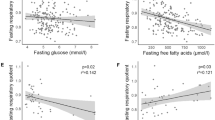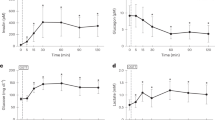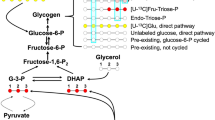Abstract
The metabolism of carbohydrates is largely determined by their chemical properties. Glucose may have been selected, over the other aldohexoses, because of its low propensity for glycation of proteins. That carbohydrate is stored in polymeric form (glycogen) is dictated by osmotic pressure considerations. That stored fat is about eight times more calorically dense than glycogen, when attendant water is factored in, accounts for the predominance of fat as a storage form of calories and, also, for the fact that ingested carbohydrate is oxidized promptly (that is, fuel of the fed state) rather than being extensively stored. That stored glycogen is accompanied by so much water accounts for the fact that the brain only has very small glycogen stores. Carbohydrate has two important advantages, over fat, as a metabolic fuel; it is the only fuel that can produce ATP in the absence of oxygen, and more ATP is produced per O2 consumed when glucose is oxidized, compared with when fat is oxidized. These advantages probably determine the preference of many cell types for carbohydrate. In addition to its use as a metabolic fuel, glucose plays other important roles such as provision of NADPH via the pentose phosphate pathway, and as a source material for the synthesis of other key carbohydrates, for example, ribose and deoxyribose for nucleic acid synthesis and substrates for the synthesis of glycoproteins, glycolipids and glycosaminoglycans. It can also play a key role in anaplerosis. Although it is widely acknowledged that gluconeogenesis plays a crucial role in starvation it is now apparent that prandial gluconeogenesis occurs, both in the metabolic disposal of dietary amino acids and in the synthesis of glycogen by the indirect pathway. Although there is, strictly speaking, no dietary requirement for carbohydrate it is evident that glucose is a universal fuel for probably all cells in the body and carbohydrate is the cheapest source of calories and the major source of dietary fibre. These observations, together with the fact that glucose is the preferred metabolic fuel for the brain, permit us to recommend appreciable quantities of carbohydrate in all prudent diets.
This is a preview of subscription content, access via your institution
Access options
Subscribe to this journal
Receive 12 print issues and online access
$259.00 per year
only $21.58 per issue
Buy this article
- Purchase on Springer Link
- Instant access to full article PDF
Prices may be subject to local taxes which are calculated during checkout
Similar content being viewed by others
Author information
Authors and Affiliations
Rights and permissions
About this article
Cite this article
Brosnan, J. Comments on metabolic needs for glucose and the role of gluconeogenesis. Eur J Clin Nutr 53 (Suppl 1), s107–s111 (1999). https://doi.org/10.1038/sj.ejcn.1600748
Published:
Issue Date:
DOI: https://doi.org/10.1038/sj.ejcn.1600748
This article is cited by
-
Lkb1 suppresses amino acid-driven gluconeogenesis in the liver
Nature Communications (2020)
-
Macronutrient Composition and Food Selection
Obesity Research (2001)



